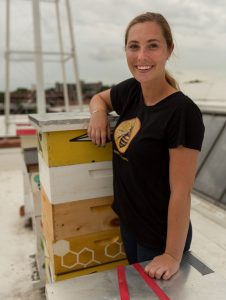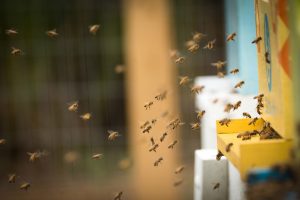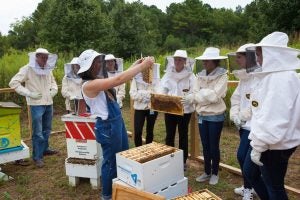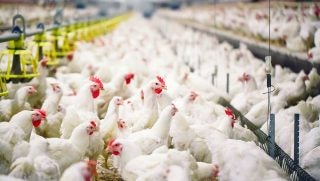How one business brings agriculture to the cityscape on pollinators’ wings
DURHAM, North Carolina — A fourth-generation passionate beekeeper has found herself in the heart of an urban jungle. A bee colony wouldn’t exactly make for ideal new college roommates, so naturally, she took to the rooftop of American Tobacco Campus, where she was interning, and got permission to place a hive there. Recognizing that the Durham company was itself founded on agriculture, the CEO was more than willing to help support the cause.
From that humble framework, Leigh-Kathryn Bonner built her pollinator empire, Bee Downtown, a company that helps brings pollinators into the urban world by placing colonies on the campuses of America’s biggest corporations. Chick-fil-A, IBM and Delta are just a handful of their notable clients.
The graduate of North Carolina State University has addressed a concern of the agricultural community and simultaneously created a sustainable, profitable business within the bee industry. Bee Downtown is a very simple concept: It provides a turnkey year-round employee sustainability program while keeping functional, thriving colonies on corporation campuses. Employees learn about the role and impact of pollinators, leadership and beekeeping — plus the honey is offered as a very sweet bonus.

Why go urban?
Bonner grew up around beekeeping and spent time on her grandparents’ farm, but it was an introductory college course to bees and beekeeping that really made her fall in love with the humble honeybee. It was in that class that she met her mentor, Dr. John Ambrose.
“He talked about the very serious issue of agricultural honeybee decline in a way that, up to the 5,000 students that he taught of multiple generations, felt like if they cared just a little bit they could make a difference,” she said. “That really stuck with me.”
During her preliminary research into urban beekeeping, Bonner observed that most of the articles and discussions stemmed from hobbyists in large metropolises such as New York and Chicago.
“Those are great places to keep bees, but it struck me that our agricultural states were not keeping bees in those urban environments. We just didn’t have that push for urban agriculture like some of our larger cities did,” she said. “North Carolina was built on agriculture, Georgia was built on agriculture, and I wanted to make sure that as we grew as a state and in those larger cities that we remembered where we came from. Because at the end of the day, the most important thing is to remember where you came from and how you got where you are.”
And for the bees, an urban sprawl makes a better habitat than you might think. They have multiple food resources and stable living conditions. Bees from a single hive will travel a three-mile radius, positively impacting 18,000 acres. When more companies in close proximity adds hives, it creates a corridor.

A serious business
The services that Bee Downtown provides is a financial commitment for the companies involved. When she was developing her company, Bonner was faced with some harsh criticism. Some feedback argued she was profiting off of honeybee decline and trying to cash in on a serious issue.
“I’m just trying to leave the world in a better place than when I found it, and I did learn that I’m not going to apologize for the cost of this program,” she explained. “I don’t know when it happened or how it happened, but at some point, we stopped valuing farmers and their intelligence. We don’t see the value of how important agriculture is because we just lost sight of it. In the cities we don’t see it anymore, people just don’t understand that farmers are the smartest people they will ever meet.
“We charge a premium for what we do at Bee Downtown because we also want to reintroduce this notion of people who are in agriculture deserve to be paid for what they do. And that their work has so much worth in our world. So, what we do is not for free … but it also allows us to build a fantastic program for these companies and hire some of the best beekeepers I think in the country.”
Additionally, Bonner, who was recently named to Forbes’ national 2019 “30 Under 30” list, notes that they have been given the opportunity to hire young people in their company. They employ several full-time beekeepers charged with maintaining their hives. This way, she notes, a new generation of agriculturalists have an opportunity to become involved in the bee industry in ways and in places they wouldn’t have thought possible.

The bigger picture
“People love bees,” Bonner said. “Our director of community partnerships jokingly says honeybees are the pandas of the insect world.”
She refers to honeybees as being the “gateway” to a much larger discussion about agriculture and the science of food production. She sees testament to that time and time again from all the major corporations she has done deals with at Bee Downtown.
“It’s amazing how many meetings I walk into and the first words out of somebody’s mouth are, ‘I’m a beekeeper, my father was a beekeeper, and I used to love seeing the butterflies in my garden.’ … People still love agriculture and want to be a part of it. I think part of the problem in these cities and in these large corporations, they don’t exactly know how. So, we bring it to their campus.
“What we’ve found from these companies is that they love it. Their employees love it, these companies fall deeply in love with these bees, and the first thing they say is, ‘What can we do to help the bees?’ And that turns into a much larger conversation — well what can you do to help agriculture?”
The companies who invest in Bee Downtown also report seeing the positive impacts in their work environments and with their customers. Hundreds of employees have been surveyed throughout a multitude of industries after having gone through the Bee Downtown program. The vast majority continues to report it has made them prouder of the companies they work for and that they’d like to continue to learn more about what they can do to support pollinators. Customers also appreciate knowing they do business with companies who care about the environment and local communities.
Currently, Bee Downtown has hives in the Raleigh/Durham area as well as in Atlanta. The next step involves expansion to other East Coast cities such as Charlotte, North Carolina, and maybe Washington, D.C.
Part of the beauty of Bee Downtown is its simplicity. All the work to manage and keep the hives healthy is taken care of, employees just need to be willing to learn, Bonner says.
“We’re not asking everyone in the city to become a farmer or become a beekeeper,” she said. “We’re just asking that they take the time to learn about how important agriculture is to our world and what it means as we look forward and look for more sustainable agricultural processes.”
“There’s a reason why it’s working. There’s a reason why corporations want beehives,” she said. “We want to tell that story of agriculture, and I think we’ve been given the large platform to share that story with some very influential people, and we will continue to share that story.”
Jaclyn Krymowski is a graduate of The Ohio State University with a major in animal industries and minor in agriculture communications. She is an enthusiastic agvocate, professional freelance writer, and blogs at the-herdbook.com.



